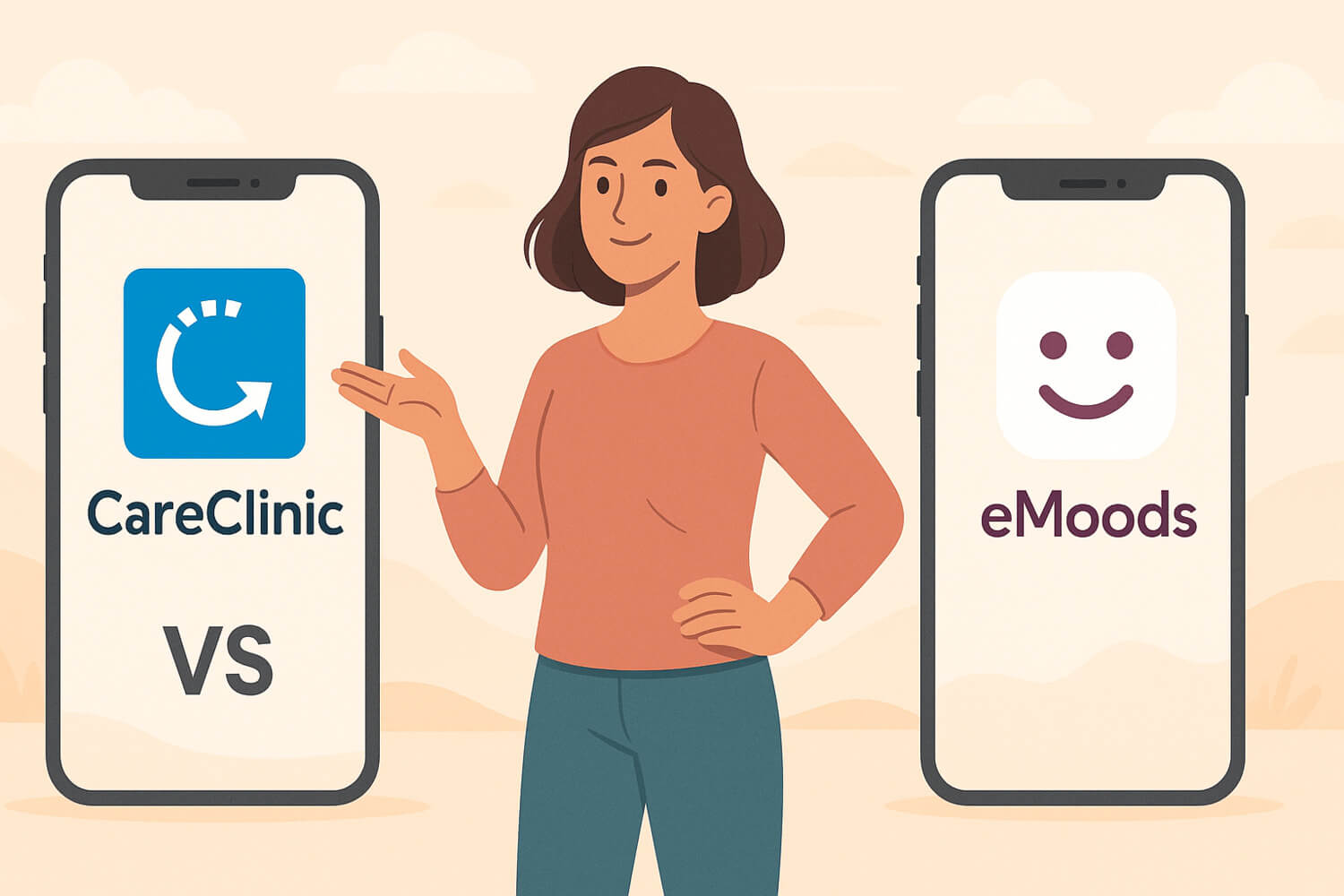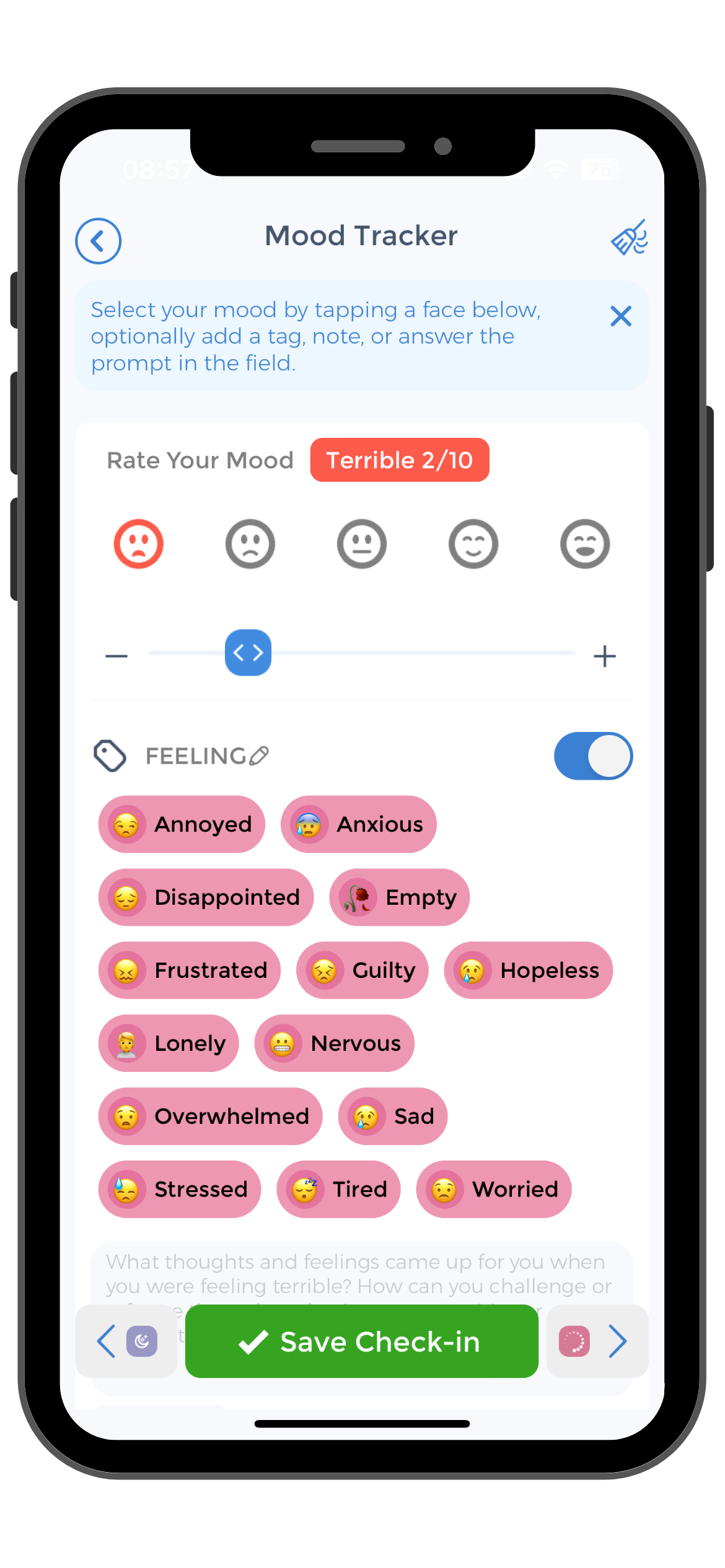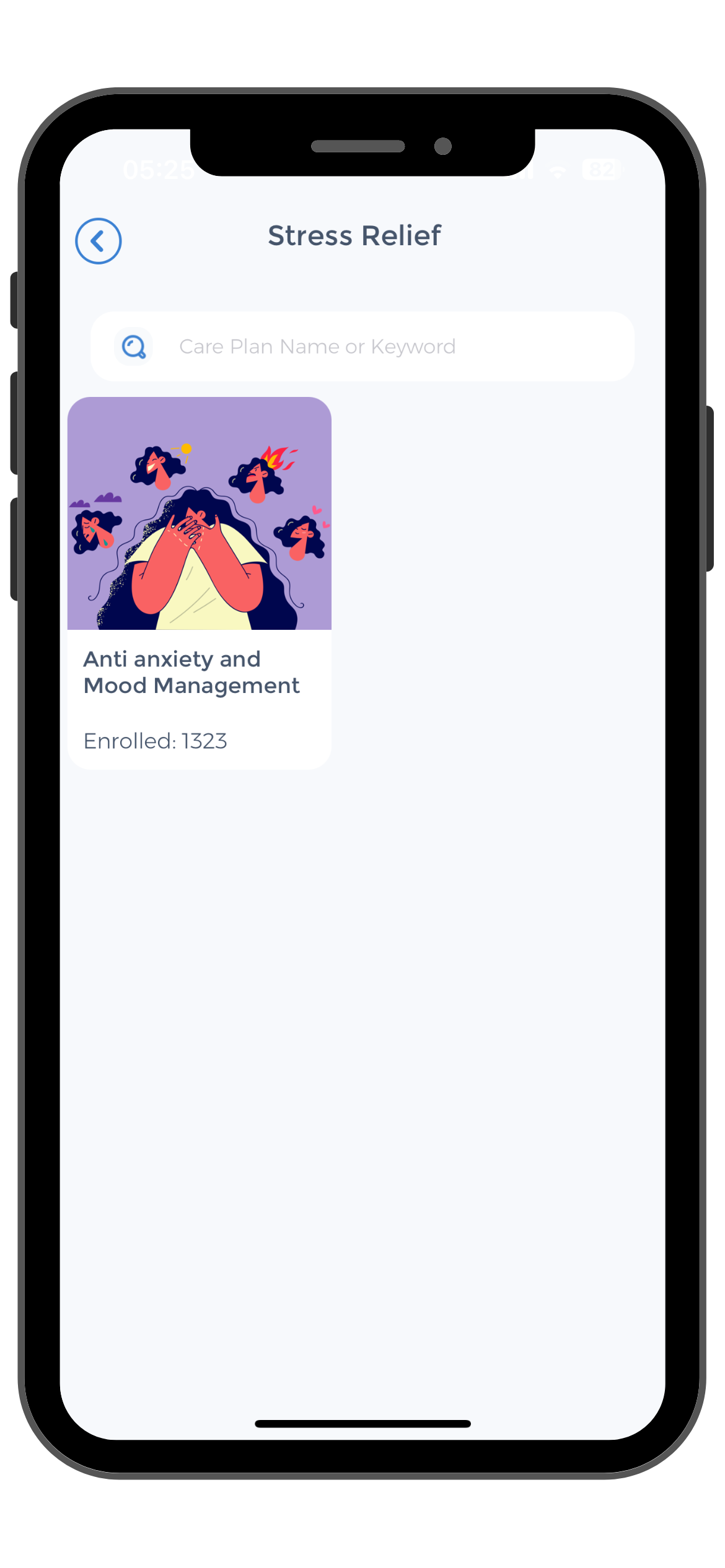
When comparing CareClinic vs eMoods for bipolar disorder management, the right choice can dramatically impact your mental health journey. You need an app that captures mood fluctuations accurately while providing actionable insights. But with both apps claiming to be the best solution for bipolar tracking, which one delivers the comprehensive support you need?
Let’s dive into this detailed CareClinic vs eMoods comparison that goes beyond marketing claims to examine how these apps perform in real-world bipolar disorder management. Whether you need simple mood logging or comprehensive health tracking, this guide will help you make the right choice.
Table of Contents
- CareClinic vs eMoods: The Apps at a Glance
- Will CareClinic vs eMoods Fit Into My Daily Life?
- Feature Comparison: CareClinic vs eMoods Head-to-Head
- Tracking Bipolar Episodes: CareClinic vs eMoods Approaches
- Medication Management: Basic Logging vs. Comprehensive Tracking
- Sleep Tracking in CareClinic vs eMoods: The Bipolar Connection
- Beyond Basic Tracking: Therapeutic Tools
- Real-World Applications: How CareClinic vs eMoods Perform
- Privacy and Data Security: Your Health Information Matters
- Integration with Your Healthcare Ecosystem
- Support for Complex Mental Health Needs
- The Family Factor: Supporting Your Support System
- Questions People Ask About CareClinic vs eMoods
- Making Your Choice: CareClinic vs eMoods Final Verdict
- The Bottom Line on CareClinic vs eMoods
CareClinic vs eMoods: The Apps at a Glance

eMoods emerged as a specialized tool laser-focused on bipolar disorder tracking. Created by someone who understands the condition firsthand, it strips away complexity to focus on core mood tracking. Simple daily entries. Basic medication logging. No distractions.
CareClinic takes a different approach. Built by healthcare professionals and data scientists, it recognizes that bipolar disorder doesn’t exist in isolation. Your mood connects to sleep, medications, diet, exercise, and countless other factors. Understanding these complex relationships requires sophisticated bipolar mood tracking capabilities that go beyond simple diary entries. When you track mood variations alongside physical symptoms, medication timing, and environmental factors, patterns emerge that would otherwise remain hidden. This integrated approach reveals how seemingly unrelated factors like sleep disruption or dietary changes can trigger mood episodes days before symptoms become obvious.
The fundamental question becomes: Do you need a simple mood diary or a complete health management system that understands how everything interconnects? When managing bipolar disorder, capturing subtle mood elevations matters as much as tracking depression. Many people experiencing bipolar hypomania miss early warning signs because the elevated energy and productivity feel positive rather than problematic. A comprehensive tracking system helps identify patterns in sleep reduction, increased goal-directed activity, and racing thoughts that characterize hypomanic episodes before they escalate or cycle into depression.
Will CareClinic vs eMoods Fit Into My Daily Life?
![]()
eMoods prides itself on simplicity. Open the app, rate your mood high and low, log sleep, and check off medications. Done in 30 seconds. This streamlined approach appeals to users who find comprehensive apps overwhelming.
But here’s the catch – eMoods only allows one entry per day. Experiencing morning depression that shifts to evening hypomania? Too bad. You can only capture one mood state. For a condition characterized by rapid cycling and mixed episodes, this limitation proves crippling.
CareClinic approaches daily tracking differently. Yes, you can complete a basic mood entry in seconds. But when you need it, the depth is there. Log mood changes throughout the day. Track energy levels separately from mood. Note triggers as they happen. The app adapts to your needs rather than forcing you into a rigid structure.
The mobile app includes quick-entry widgets, voice notes, and photo captures. Having a manic episode at 3 AM? Log it immediately with full context. The flexibility means you capture accurate data when it matters most, making CareClinic an easy choice for those with complex mood patterns.
Feature Comparison: CareClinic vs eMoods Head-to-Head
Let’s cut through the marketing and examine what each app offers in this CareClinic vs eMoods comparison:
| Feature | CareClinic | eMoods |
|---|---|---|
| Multiple Daily Mood Entries | ✓ Unlimited | ✗ One per day |
| Mood Scale Options | ✓ Multiple scales | ✓ High/Low only |
| Medication Tracking | ✓ Advanced scheduling | ✓ Basic logging |
| Sleep Tracking | ✓ Comprehensive | ✓ Duration only |
| Symptom Tracking | ✓ 50+ symptoms | ✓ 4-5 basic |
| Vital Signs | ✓ Full suite | ✗ None |
| Nutrition Tracking | ✓ Complete | ✗ None |
| Exercise Logging | ✓ Detailed | ✗ None |
| Care Team Features | ✓ Full management | ✗ Email only |
| Clinical Reports | ✓ Comprehensive | ✓ Basic PDF |
| AI Insights | ✓ Pattern analysis | ✗ None |
| Device Integration | ✓ Multiple devices | ✗ None |
| Clinical Assessments | ✓ PHQ-9, GAD-7, etc. | ✗ None |
| Weather Integration | ✓ Automatic | ✓ Manual |
| Price | $9.99/month | $1.99/month |
The feature gap becomes immediately apparent. While eMoods handles basic mood tracking adequately, CareClinic provides the comprehensive toolkit needed for serious health management. For a deeper comparison with another popular mood tracker, see our CareClinic vs Daylio analysis.
Tracking Bipolar Episodes: CareClinic vs eMoods Approaches

eMoods uses a simple high/low mood scale for daily tracking. Rate your highest mood and lowest mood for the day. Check off basic symptoms like irritability or anxiety. The simplicity works well for stable periods but fails during complex episodes.
Consider mixed episodes – simultaneously experiencing manic and depressive symptoms. eMoods’ single daily entry can’t capture this complexity. You’re forced to average out your experience, losing critical diagnostic information.
CareClinic’s mood tracking adapts to bipolar complexity. Track manic and depressive symptoms separately. Log mood changes throughout the day with timestamps. Rate energy levels independently of mood. Add context through notes, voice recordings, or photos.
The app includes specific bipolar tracking features:
- Rapid cycling detection through pattern analysis
- Mixed episode identification
- Medication effectiveness tracking for mood stabilizers
- Sleep-mood correlation analysis
- Trigger identification through AI insights
- Early warning sign detection
This depth matters when managing a complex condition. Your psychiatrist needs detailed data to adjust medications effectively. CareClinic provides that granularity while keeping the interface intuitive, making it the clear winner in the CareClinic vs eMoods comparison for complex bipolar management.
Medication Management: Basic Logging vs. Comprehensive Tracking
Both apps track medications, but the implementation differs dramatically. eMoods offers a simple checklist – mark medications as taken or not taken. Add dosage notes if needed. It handles basic adherence tracking adequately.
CareClinic elevates medication management to medical-grade standards through its medication logging system. Set complex dosing schedules (twice daily, every other day, as needed). Track actual versus prescribed doses. Monitor side effects linked to specific medications. The app handles:
- Titration schedules for dose adjustments
- PRN (as-needed) medication tracking
- Drug interaction warnings
- Refill reminders with pharmacy integration
- Medication adherence analytics
- Side effect correlation with mood changes
For bipolar disorder, where medication compliance directly impacts stability, this comprehensive approach proves invaluable. You can see exactly how missed doses affect your mood patterns.
Sleep Tracking in CareClinic vs eMoods: The Bipolar Connection
Sleep disruption often triggers mood episodes in bipolar disorder. Both apps recognize this connection but approach it differently.
eMoods tracks basic sleep duration. Log when you went to bed and woke up. Simple, straightforward, limited. No sleep quality metrics. No sleep stage tracking. No correlation with mood beyond basic graphs.
CareClinic treats sleep as a vital sign for bipolar management. Track not just duration but quality, interruptions, and sleep stages through device integration. The app reveals:
- How sleep debt accumulates before manic episodes
- REM sleep changes preceding mood shifts
- Medication effects on sleep architecture
- Optimal sleep windows for mood stability
The sleep insights dashboard correlates your sleep patterns with mood episodes, helping identify early warning signs. This predictive capability can prevent full-blown episodes through early intervention.
Beyond Basic Tracking: Therapeutic Tools
eMoods focuses purely on data collection. No interventions. No therapeutic tools. No educational content. You track, generate reports, and that’s it. The app assumes you’ll figure out what to do with the data.
CareClinic integrates evidence-based therapeutic tools directly into the platform, including comprehensive symptom tracking capabilities:
Cognitive Behavioral Therapy (CBT) Modules
Interactive CBT exercises are specifically designed for bipolar disorder. Challenge cognitive distortions common in depressive episodes. Build reality-testing skills for manic periods. The modules adapt based on your current mood state.
Therapeutic Soundscapes
Clinically designed audio programs for mood regulation. Binaural beats for anxiety reduction. Nature sounds for sleep induction. Guided meditations for emotional regulation. All are integrated with mood tracking to measure effectiveness.
Crisis Planning Tools
Create detailed crisis plans while stable. The app activates appropriate interventions based on mood patterns. Share plans with care team members. Includes emergency contact integration and location-based services.
Psychoeducation Library
Comprehensive educational content about bipolar disorder. Medication guides with visual aids. Lifestyle management strategies. Family education resources. Mental health professionals review all content.
Real-World Applications: How CareClinic vs eMoods Perform
Theory aside, let’s examine how each app performs in real-world scenarios:
During a Hypomanic Episode
eMoods: Log elevated mood once daily. Note decreased sleep. Mark symptoms like “elated” or “irritable.” Generate a basic mood chart showing an upward trend. Limited actionable insights.
CareClinic: Track mood elevation throughout the day. Monitor sleep disruption in real-time. Log increased activity, spending, and social behavior. AI detects a hypomanic pattern and suggests interventions. Alerts the care team if predetermined thresholds are met. Provides specific coping strategies based on what’s worked before.
Managing Medication Changes
eMoods: Note new medication in list. Track basic adherence. Manually correlate mood changes with the medication start date through visual review of charts.
CareClinic: Set up a titration schedule with automatic adjustments. Track side effects linked to specific doses. AI analyzes mood response to medication changes. Generate detailed reports showing medication effectiveness. Predict optimal dosing based on your response patterns.
Preparing for Psychiatrist Appointments
eMoods: Generate a PDF report showing mood chart, medication list, and basic symptoms. Email to yourself or print. Limited context or analysis provided.
CareClinic: Create comprehensive clinical reports including mood patterns, medication adherence, sleep analysis, trigger identification, and treatment response. Include validated assessment scores. Share directly with the provider through a secure portal. Reports highlight critical changes and concerning patterns automatically.
Privacy and Data Security: Your Health Information Matters
eMoods takes a radically simple approach to privacy – no cloud storage whatsoever. All data stays on your device. No accounts, no syncing, no backup. While this guarantees privacy, it also means losing your phone loses years of mood data.
CareClinic balances security with functionality. HIPAA-compliant cloud storage ensures data safety while enabling crucial features like multi-device access and care team sharing. End-to-end encryption protects your information. Regular third-party security audits maintain standards.
The platform includes granular privacy controls. Share only what you want with specific people. Revoke access anytime. Export your data in standard formats. Delete everything permanently if desired.
Integration with Your Healthcare Ecosystem
Modern healthcare requires integration. Your mood tracker should connect with other health tools and providers seamlessly.
eMoods exists in isolation. No integration with electronic health records. No connection to wearable devices. No interoperability with other health apps. You manually transfer any insights to other systems.
CareClinic builds bridges throughout your healthcare ecosystem:
- Direct EHR integration with major systems
- Apple Health and Google Fit synchronization
- Wearable device connectivity for automatic vital signs
- Lab result imports for lithium levels and thyroid function
- Pharmacy integration for medication management
- Telehealth platform compatibility
This connectivity creates a complete health picture. Your mood patterns contextualized with physical health metrics reveal insights impossible to see in isolation.
Support for Complex Mental Health Needs

Bipolar disorder rarely travels alone. Anxiety, ADHD, substance use, and eating disorders commonly co-occur. How do these apps handle complexity?
eMoods maintains its narrow focus. Track mood for bipolar disorder. Period. Co-occurring conditions? Use another app. This siloed approach fragments your health data across multiple platforms.
CareClinic embraces complexity through its comprehensive health journal. Track symptoms across multiple conditions simultaneously. The correlation engine reveals connections between conditions. Anxiety triggering manic episodes? Somatoform symptoms masking mood changes? Are ADHD medications affecting mood stability? CareClinic captures and analyzes these interactions.
The platform supports tracking for:
- Anxiety Disorders
- ADHD
- PTSD
- Eating Disorders
- Substance Use
- OCD
- Personality Disorders
- Chronic Pain
- Sleep Disorders
- Autism Spectrum
- Schizophrenia Spectrum
- Dissociative Disorders
The Family Factor: Supporting Your Support System
Mental health affects entire families. Your tracking app should facilitate family involvement appropriately.
eMoods offers email reports. That’s it. No real-time sharing. No collaborative features. No family education tools. Your support system stays disconnected from your daily management.
CareClinic builds family support into the platform. Create care circles with customized permissions. Family members can:
- Receive alerts during concerning mood patterns
- Add observations about behavior changes
- Access educational resources about bipolar disorder
- Participate in care planning
- Track their own stress and caregiving burden
- Communicate with the healthcare team
This collaborative approach improves outcomes. Early intervention from informed family members prevents hospitalizations. Shared understanding reduces relationship strain.
Questions People Ask About CareClinic vs eMoods
Is CareClinic too complicated for someone in a depressive episode?
CareClinic adapts to your current capacity. During depression, use voice notes or single-tap mood logging through our depression journal features. The app remembers your patterns and reduces required inputs. You can always add detail later when feeling better. eMoods’ forced simplicity might seem easier, but it misses critical information during vulnerable periods.
Does the price difference justify CareClinic’s features?
Consider the cost of one psychiatric appointment or mood episode. CareClinic’s comprehensive tracking can prevent episodes and optimize treatment faster, saving money long-term. The investment in better health management pays dividends through improved stability and reduced healthcare costs.
Can I import my eMoods data into CareClinic?
Yes. Export your eMoods data as CSV and import directly into CareClinic. The migration tool maps eMoods’ limited fields to CareClinic’s comprehensive structure. You’ll immediately see patterns invisible in eMoods’ basic charts.
Which app do psychiatrists prefer?
Healthcare providers consistently prefer comprehensive data. CareClinic’s detailed reports, validated assessments, and medication tracking provide actionable clinical information. eMoods’ basic charts require significant interpretation and miss crucial context.
Making Your Choice: CareClinic vs eMoods Final Verdict
The decision ultimately depends on your health management goals and complexity needs when evaluating CareClinic vs eMoods.
Choose CareClinic if:
- You want comprehensive health tracking beyond basic mood logging
- You experience rapid cycling or mixed episodes requiring detailed tracking
- You take multiple medications requiring complex scheduling
- You want to understand the connections between mood and lifestyle factors
- You need professional-grade reports for healthcare providers
- You value predictive insights and early warning systems
- You want integrated therapeutic tools and interventions
- You need care team collaboration features
- You have co-occurring conditions requiring unified tracking
- You want long-term data analysis and pattern recognition
Choose eMoods if:
- You only need basic daily mood tracking
- You have stable bipolar disorder with minimal complexity
- You prefer absolute data privacy over features
- You find any complexity overwhelming
- You don’t need healthcare provider collaboration
The Bottom Line on CareClinic vs eMoods
eMoods serves a specific purpose – simple mood tracking for stable bipolar disorder. It does this adequately with admirable focus and privacy protection. For basic needs, it’s a reasonable choice.
But bipolar disorder is rarely simple. The condition’s complexity demands sophisticated tracking tools. CareClinic provides the comprehensive platform needed to understand and manage all aspects of bipolar disorder and overall health.
From multiple daily mood entries to medication management, from sleep analysis to family collaboration, from AI insights to therapeutic interventions, CareClinic transforms raw data into actionable health improvements.
The choice between basic mood logging and comprehensive health management determines whether you’re simply recording your bipolar journey or actively improving it. For those serious about achieving stability and understanding their condition deeply, CareClinic provides the tools needed for meaningful insights and better outcomes.
Ready to move beyond basic tracking? Start your CareClinic journey today and discover what comprehensive bipolar management means.


